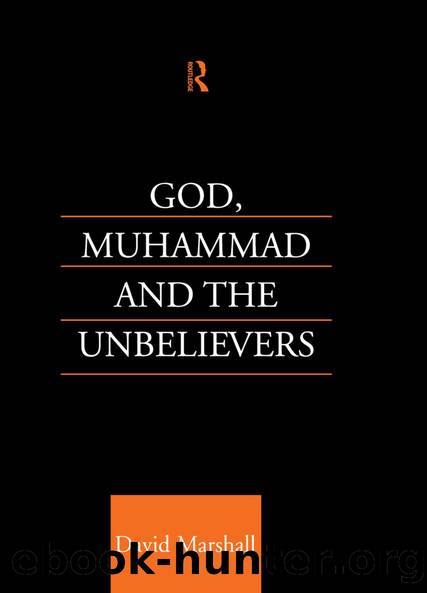God, Muhammad and the Unbelievers by David Marshall

Author:David Marshall [Marshall, David]
Language: eng
Format: epub
ISBN: 9780415759946
Barnesnoble:
Publisher: Taylor & Francis
Published: 2014-05-19T00:00:00+00:00
17 See Robinson 1996, pp.106â109, for an analysis of the formal elements of these narratives.
18 I follow Arberry in translating kadhdhaba, the root verb, as âto cry liesâ.
19 One other very brief reference to which Horovitz makes no reference occurs at 77:16â17: âDid we not destroy the ancients, and then follow them with the later folk?â
20 This plural implies that the message and its warning extend beyond Mecca to surrounding towns, which is also suggested in other Meccan passages in which Muhammad is spoken of as being sent to warn the mother of the cities (Mecca) and those around her (6:92; 42:7). On the other hand, Bell (1991, p.243) suggests that this could be a warning to the Jews of Medina and around.
21 Unsurprisingly, Bell (1991, ad loc.) judges v.4 to be âa later insertion to obviate the difficulty of the continued delay of the eventâ, partly on stylistic grounds. There is an interesting parallel to this verse in Psalm 90:4, alluded to at 2 Peter 3:8 in a context analogous to the QurÉanic passage, that of a discussion of the perceived delay in divine intervention.
22 Bell (1937, ad loc.) dates it as Medinan.
23 This theme of waiting for Godâs punishment recurs in a late Medinan passage at 9:52, but it is clear that in this context waiting no longer implies passivity on the part of the believers: âWe are awaiting in your case too, for God to visit you with punishment from him, or at our hands; so await; we are awaiting with you.â
24 Surah 13 is taken as Medinan in the official Egyptian edition, but Nöldeke and other Western scholars date it as late Meccan (Watt and Bell 1970, p.207); even Bell declares that verse 40 is âcertainly Meccanâ (Bell 1991, ad loc.). The first half of the verse, in which it is suggested that Muhammad might die before the punishment falls, strongly suggests a Meccan dating.
25 This excursus has been placed here, rather than being made into a short chapter earlier in the study, because it is at this stage in the unfolding argument that the relevance of the question of Godâs attitude to the unbeliever becomes most apparent.
26 For further comment on Rahbar see Paret 1975b. Paret criticizes what he sees as Rahbarâs forced interpretation of the apparently predestinarian passages, but his criticisms do not call into question Rahbarâs emphasis on the primacy of justice over mercy in the QurÉanic picture of God. Bouman (1977, p.179, n.279) cites Kraemerâs criticisms (in Dutch) of God of Justice. For an analysis of Rahbarâs approach to exegesis of the QurÉan see Saldanha 1963.
27 The translation here largely follows Cragg 1988.
28 My interpretation of this and other narratives as reflections of Muhammadâs experience will be supported towards the end of this chapter by reference to several non-narrative passages which illustrate the same point.
29 If there is any truth in this observation, it is interesting to follow it up with some comments on the occurrence of the word amÄ«n elsewhere in the QurÉan.
Download
This site does not store any files on its server. We only index and link to content provided by other sites. Please contact the content providers to delete copyright contents if any and email us, we'll remove relevant links or contents immediately.
The European Opportunity by Felipe Fernández-Armesto(569)
The European History Highway: A Guide to Internet Resources by Dennis A. Trinkle Scott A. Merriman(535)
Morgan Kaufmann Digital Watermarking and Steganography by Ingemar Cox Matthew Miller Jeffrey Bloom Jessica Fridrich Ton(528)
The Seven Wonders of the Ancient World by Michael Denis Higgins(521)
Hyperculture by Byung-Chul Han(510)
European Security without the Soviet Union by Stuart Croft Phil Williams(507)
European Security in a Global Context by Thierry Tardy(506)
The Routledge companion to Christian ethics by D. Stephen Long Rebekah L. Miles(498)
Get Real with Storytime by Julie Dietzel-Glair & Marianne Crandall Follis(444)
Hudud Al-'Alam 'The Regions of the World' - a Persian Geography 372 A.H. (982 AD) by V. V. Minorsky & C. E. Bosworth(437)
Tibetan Studies in Comparative Perspective by Chih-yu Shih Yu-Wen Chen(435)
Gorbachev And His Generals by William C. Green(429)
Governance, Growth and Global Leadership by Espen Moe(419)
How Languages Are Learned 5th Edition by Patsy M Lightbown;Nina Spada; & Nina Spada(407)
CliffsNotes on Fitzgerald's The Great Gatsby by Kate Maurer(400)
The Oxford History of the World by Fernández-Armesto Felipe;(388)
The Egyptian Economy, 1952-2000 by Khalid Ikram(379)
Oral Poetry and Narratives from Central Arabia: The Poetry of Ad-Dindan : A Bedouin Bard in Southern Najd (Studies in Arabic Literature, Vol 17) (English and Arabic Edition) by P. M. Kupershoek P. Marcel Kurpershoek(365)
The Oxford Handbook of the Incas by Sonia Alconini(365)
